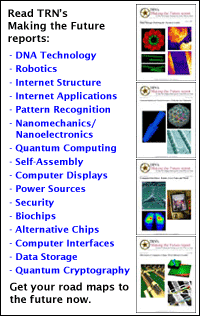
Fault-tolerance free speech
By Kimberly Patch, Technology Research NewsFree speech on the World Wide Web sometimes lasts only as long as it takes a secret police agent, judge, or corporate lawyer to swing into action.
In an effort to strengthen free cyber speech, two scientists from AT&T labs and a New York University grad student have put together software that allows for Web publishing that is both anonymous and difficult to remove.
The software, called Publius after the pen name of the Federalist Papers authors, encrypts a file and publishes it on many sites. Because it is encrypted, however, the sites carrying it cannot read it. Publius then breaks up the encryption key and sends single pieces, or shares, around to the sites. But the publishing sites still can't read the encrypted document.
"The Web servers have no idea what's being stored at their site because they only get one share and the encrypted file -- they don't get information on where the other shares are," Avi Rubin, a research scientist at AT&T Labs.
To read a Publius document, a person must download a copy of it, then download a certain number of shares to reconstruct the key, then use the key to decrypt the document. The publisher can set the number of key shares needed to reconstruct the key. The default is three of twenty available shares.
This way, shutting down one, or even most of the servers carrying the document will not preclude people from continuing to access it. "If somebody shuts down 15 of the servers as long as there are still five or even three [available], then the key can be reconstructed," said Rubin.
Rubin said the researchers goal is to make the Web more censor resistant. "There are numerous examples where there might be pressure on someone to take down a Web site that somebody else doesn't like," Rubin said. "Imagine a very powerful chemical company that's dumping chemicals a river," said Rubin. "If you want to make people aware of it... but you don't want any retribution and you don't want [the company] to be able to take it down... then you might want to publish it on Publius," he said.
The researchers are making the software available for a two-month Internet trial starting July 28. It can be downloaded at cs.nyu.edu/waldman/publius.
After the trial, the researchers will make adjustments to the software and either continue the trial or do a new deployment, said Reuben. "Our goal is to have this thing existing and widespread on the Web," he added.
Avi Reuben's colleagues in the research are AT&T Labs Research Scientist Lorrie Cranor and New York University Ph.D. student Mark Waldman. They are presenting a paper on the subject at the Usenix Security Symposium in August.
The project was funded by a Usenix student grant awarded to Waldman.
Timeline: Now
Funding: Association; Corporate
TRN Categories: Internet; Computers and Society
Story Type: News
Related Elements: Anonymous Publishing Website
Advertisements:
July 12, 2000
Page One
Bendable nanotubes store bits
Protein-coated chip sniffs out bacteria
The little light-sensitive molecule that could
Fault-tolerant free speech
Chemical reaction zips nanowires onto silicon
News:
Research News Roundup
Research Watch blog
Features:
View from the High Ground Q&A
How It Works
RSS Feeds:
News
Ad links:
Buy an ad link
| Advertisements:
|
 |
Ad links: Clear History
Buy an ad link
|
TRN
Newswire and Headline Feeds for Web sites
|
© Copyright Technology Research News, LLC 2000-2006. All rights reserved.